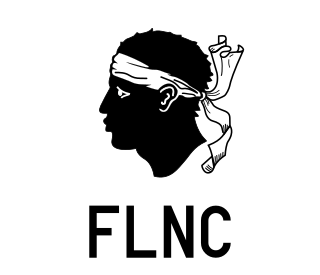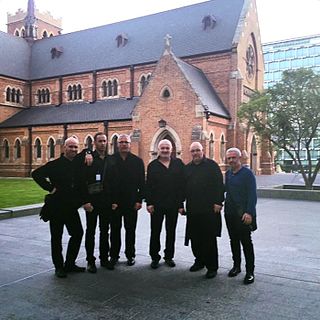Related Research Articles

Corsican is a Romance language consisting of the continuum of the Italo-Dalmatian dialects spoken on the Mediterranean island of Corsica, France, and in the northern regions of the island of Sardinia, Italy, located due south.
In France, music reflects a diverse array of styles. In the field of classical music, France has produced several prominent romantic composers, while folk and popular music have seen the rise of the chanson and cabaret style. The oldest playable musical recordings were made in France using the earlist known sound recording device in the world, the phonautograph, which was patented by Édouard-Léon Scott de Martinville in 1857. France is also the 5th largest market by value in the world, and its music industry has produced many internationally renowned artists, especially in the nouvelle chanson and electronic music.

The National Liberation Front of Corsica is a name used by many militant groups that advocate an independent state on the island of Corsica, separate from France. The organisations are primarily present in Corsica and less so on the French mainland. A Conculta Naziunalista was often considered to be the political wing of the original organisation.

Outside France the island of Corsica is perhaps best known musically for its polyphonic choral tradition. The rebirth of this genre was linked with the rise of Corsican nationalism in the 1970s. The anthem of Corsica is "Dio vi Salvi Regina".

The Corsican Assembly or Assembly of Corsica is the unicameral legislative body of the territorial collectivity of Corsica. It has its seat at the Grand Hôtel d'Ajaccio et Continental, in the Corsican capital of Ajaccio. After the 2017 territorial elections, the assembly was expanded from 51 to 63 seats, with the executive council expanding from 9 to 11 members.

Patrick Chouchayan, known by his stage name Patrick Fiori, is a French singer of Armenian descent.
The Corsicans are a Romance ethnic group. They are native to Corsica, a Mediterranean island and a territorial collectivity of France.

I Muvrini is a Corsican folk music group, who sing traditional Corsican music in their native Corsican language.

Corsica is an island in the Mediterranean Sea and one of the 18 regions of France. It is the fourth-largest island in the Mediterranean and lies southeast of the French mainland, west of the Italian Peninsula and immediately north of the Italian island of Sardinia, the nearest land mass. A single chain of mountains makes up two-thirds of the island. As of January 2024, it had a population of 355,528.

Hector Zazou was a prolific French composer and record producer who worked with, produced, and collaborated with an international array of recording artists. He worked on his own and other artists' albums, including Sandy Dillon, Mimi Goese, Barbara Gogan, Sevara Nazarkhan, Carlos Núñez, Italian group PGR, Anne Grete Preus, Laurence Revey, and Sainkho since 1976.

Italian irredentism in Corsica was a cultural and historical movement promoted by Italians and by people from Corsica who identified themselves as part of Italy rather than France, and promoted the Italian annexation of the island.

Corsica wine is wine made on the Mediterranean island of Corsica. Located 90 km west of Italy, 170 km southeast of France and 11 km north of the island of Sardinia, the island is a territorial collectivity of France, but many of the region's winemaking traditions and its grape varieties are Italian in origin. The region's viticultural history can be traced to the island's settlement by Phoceans traders in 570 BC in what is now the commune of Aléria. In the 18th century, the island came under the control of France. Following the independence of Algeria from French rule, many Algerian Pieds-Noirs immigrated to Corsica and began planting vineyards. Between 1960 and 1976 the vineyard area in Corsica increased fourfold. In 1968, Patrimonio was established as Corsica's first Appellation d'origine contrôlée (AOC). Today, Corsica has nine AOC regions including the island-wide designation Vin de Corse AOC. The majority of the wine exported from Corsica falls under the Vin de pays designation Vin de Pays de l'Île de Beauté. The three leading grape varieties of the region are Nielluccio (Sangiovese), known as the spice wine of France, Sciacarello and Vermentino.

A Filetta is an all-male singing group that performs traditional music from Corsica. It's made up of Corsican singers who try to popularize the traditional Corsican Polyphony singing style. To assert its Corsican identity, the group's name refers to a kind of fern that grows on the island.

Corsican nationalism is the concept of a cohesive nation of Corsica and a national identity of its people. The Corsican autonomy movement stems from Corsican nationalism and advocates for further autonomy for the island, if not outright independence from France.
The Corsican mafia is a collective of criminal groups originating from Corsica. The Corsican mafia is tied to both the French underworld and the Italian organized crime groups. The Corsican mafia is an influential organized crime structure operating in France, as well as North African and Latin American countries.

The Corse or Corsicana is a French breed of cattle indigenous to the island of Corsica.
The 2017 Corsican territorial elections were held on 3 and 10 December 2017 to elect 63 members of the Corsican Assembly, who in turn determined the composition of the Executive Council of Corsica. The election was held only two years after the 2015 territorial elections, and were called as a result of the planned creation of a single collectivity within Corsica resulting from the mergers of two departments, and the existing territorial collectivity of Corsica.
Alte Voce is a Corsican group, who sing Corsican music in the Corsican language.
Marie-Antoinette Maupertuis, also called Nanette Maupertuis, is a French politician and academic practicing in Corsica.

In March 2022, the island of Corsica, France, saw protests in response to a prison attack on nationalist leader Yvan Colonna. There were rallies in the main cities of Ajaccio, Calvi and Bastia that descended into violent clashes between police and protestors. Protestors threw stones and flares at gendarmes.
References
- ↑ Bithell, Caroline (1996). "Polyphonic Voices: National Identity, World Music, and the Recording of Traditional Music in Corsica". British Journal for Ethnomusicology. 5: 39–66.